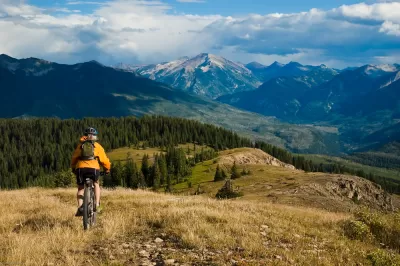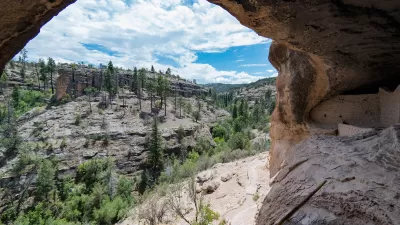Environmental groups are split over legislation that would remove the nationwide ban on bicycles in the wild.

A proposal, from national nonprofit Sustainable Trails Coalition, would allow other federal agencies to decide whether to apply language in the U.S. Wilderness Act banning "mechanical transport" to bikes on a case-by-case basis.
Since bikes are currently banned on 106 million acres of federal wilderness land in the United States, that flexibility could make a big dent.
Local conservation groups in Oregon have opposed the proposal—some for reasons more philosophical than ecological. In an article by Jamie Hale for The Oregonian, activists say they're protecting a perceived ethos of nature; one spokesperson cites values of "humility" and "restraint," claiming that bikes don't "belong" in nature.
A more pragmatic approach comes up in the comments, where locals argue that the velocity and volume of mountain bikes amplifies their impact on trails.
But if a philosophy of the wilderness remains at issue, it’s worth noting that an attitude that sees only organic access to nature as legitimate can also impact people who use strollers, wheelchairs, and other tools that, while allowed on trails, still face barriers to accommodation there.
Congress has not yet acted on the proposal. If it were to pass, agencies would determine how to approach the issue, and could impose their own restrictions on bikes.
FULL STORY: Do mountain bikes belong in the wild? Battle brewing over bike access to federal land

Alabama: Trump Terminates Settlements for Black Communities Harmed By Raw Sewage
Trump deemed the landmark civil rights agreement “illegal DEI and environmental justice policy.”

Study: Maui’s Plan to Convert Vacation Rentals to Long-Term Housing Could Cause Nearly $1 Billion Economic Loss
The plan would reduce visitor accommodation by 25% resulting in 1,900 jobs lost.

Planetizen Federal Action Tracker
A weekly monitor of how Trump’s orders and actions are impacting planners and planning in America.

Waymo Gets Permission to Map SF’s Market Street
If allowed to operate on the traffic-restricted street, Waymo’s autonomous taxis would have a leg up over ride-hailing competitors — and counter the city’s efforts to grow bike and pedestrian on the thoroughfare.

Parklet Symposium Highlights the Success of Shared Spaces
Parklets got a boost during the Covid-19 pandemic, when the concept was translated to outdoor dining programs that offered restaurants a lifeline during the shutdown.

Federal Homelessness Agency Places Entire Staff on Leave
The U.S. Interagency Council on Homelessness is the only federal agency dedicated to preventing and ending homelessness.
Urban Design for Planners 1: Software Tools
This six-course series explores essential urban design concepts using open source software and equips planners with the tools they need to participate fully in the urban design process.
Planning for Universal Design
Learn the tools for implementing Universal Design in planning regulations.
Caltrans
Smith Gee Studio
Institute for Housing and Urban Development Studies (IHS)
City of Grandview
Harvard GSD Executive Education
Toledo-Lucas County Plan Commissions
Salt Lake City
NYU Wagner Graduate School of Public Service




























